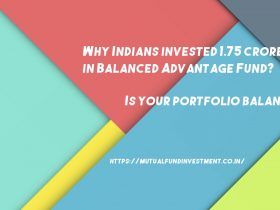Active investing requires a hands-on approach, typically by a portfolio manager. Expense ratio is higher as it is managed by a active portfolio manager. Passive investing involves investors buying index funds or ETF. This blog help you on “How to select the best”
Historically, passive investments have earned more money than active investments.
To simplify and understand the market, an index is a method to track the performance of a group of stocks in a standardized way. There is Nifty index, Nifty next index, Midcap, smallcap and many more. Apart from low expense passive investing, index funds offers different style of investing. There are Momemtum investing, Value investing, Quality investing and Alpha based investing.
Momentum Investing :
It is based on approach buy-high-sell-higher. The premise that stocks doing well have momentum and hence, will continue to do well in the near term. So, momentum investing tries to ride this wave (or momentum) of stocks that are doing well and then, jump on to the next wave. Momentum investing has proven to be a highly rewarding factor strategy over the last several years. It has also outperformed the broader indices, for instance, the Nifty200 Momentum 30 Index has outperformed the Nifty 100, and Nifty 200 indices in 8 out of the last 10 calendar years.
If you are an aggressive investor, you can invest in Momentum Mutual funds
Top Momentum Mutual funds are
- Tata Nifty Midcap 150 Momentum 50 Index funds
- Motilal Oswal Nifty 200 Momentum 30 Index funds
- ICICI Prudential Nifty 200 Momentum 30 Index funds
Value Investing :
Value ETFs look to invest primarily in the stocks of companies that are trading blowing their intrinsic worth, compared to either their peers or the broader market—using metrics such as the price-to-earnings (P/E) ratio. Value ETFs are more conservative; they may perform better in volatile markets but can come with less potential for growth.
Value Investing works for Lower risk tolerance conservative investors
Nifty 50 Value 20 selects based on,
- The company should be a part of NIFTY 50.
- Companies are selected based on ROCE (return on capital employed), PE (Price-to-earnings ratio), PB (Price-to-book) and DY (Dividend Yield).
- Companies with relatively lower PE and PB and higher dividend yield and ROCE are selected.
Nifty 500 Value 50 selects 50 stocks by,
- Stocks from NIFTY 500 index eligible for inclusion.
- 50 companies that rank high on Earnings to Price ratio (E/P), Book Value to Price ratio (B/P), Sales to Price ratio (S/P) and Dividend Yield are selected.
Nippon India Nifty 50 Value 20 Index Growth Direct Plan
Quality Investing :
Quality investing invests based on Does the Company innovate? Is it a low ROE business? Are the shares liquid enough? How much has the promoter pledged and how much do promoters hold?. It gets quality parameters of the companies and invests. Below parameters considered to select quality stocks,
- Return On Equity
- Return On Capital Employed
- Earnings Stability
- Dividend Growth
- Strength Of Balance Sheet
- Low Financial Leverage
- Cash Flows
Quality Investing is best for long term wealth building
Top quality index funds are
- Edelweiss Nifty 100 Quality 30 Index fund
- UTI Nifty Midcap 150 Quality 50 Index fund
- DSP Nifty Midcap 150 Quality 50 Index fund
Alpha Low Volatility Investing :
Alpha measures the return of an asset compared to the underlying benchmark index. Let’s say over the last year, the Straits Times Index returned 4% and the stock returned 10%, or 6% over the benchmark index; this would give the stock an alpha value of 6. If the stock had instead lost 2% in value, it would then have an alpha value of -6.
Low volatility stocks exhibit very less volatility compared to their peers in a certain time period. However, that doesn’t mean these stocks will not be volatile, just that the chances are low. Nifty Alpha Low-Volatility 30 Index is designed to reflect the performance of a portfolio of stocks selected based on top combination of Alpha and Low Volatility. Invests in relatively less volatile and have the potential to outperform the broader market
Alpha Low Volatility invests is good for investor who looks for less risk and less volatile equity investing.
- ICICI Prudential Nifty Alpha Low Volatility 30 ETF FoF fund
- Nippon India Nifty Alpha Low Volatility 30 Index fund
Index funds with various parameter option offers the different investment strategy for investors. Along with our existing funds, we can add these factor based index funds to diversify and get better returns.









